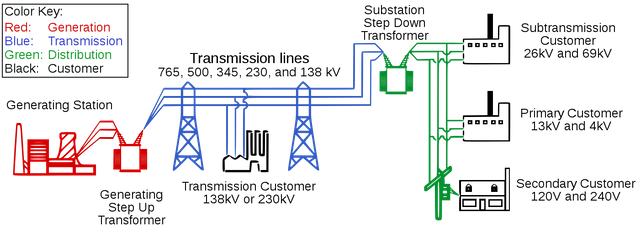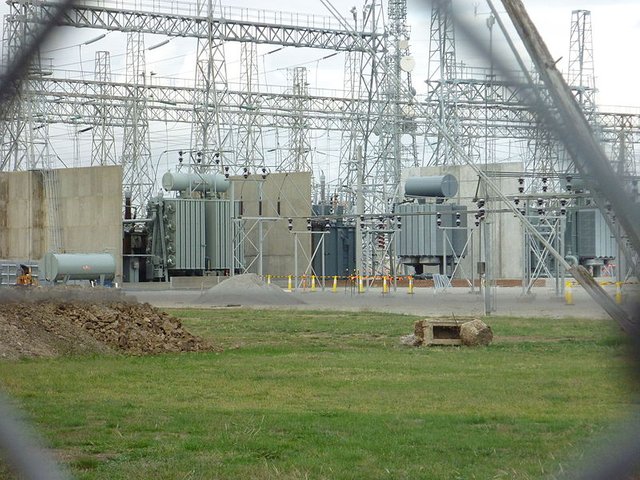My Experience Working as an Electrical Engineer

Source: United States Department of Energy as a CC3.0 Unported distribution of a Public Domain image.
This image depicts a simplified view of AC power generation and distribution.

Source: Allalone89 as Public Domain.
Melbourne Terminal Station showing both high voltage transformers and fire barriers.
Before you get worried, this isn't going to be very theoretical but rather a discussion on end product application. Essentially what I have done is looked at the pricing of materials (cable, transformers, etc) and acted on financial principle to find the cheapest material that can safely complete a given task. Now this is made slightly easier on some contracts as some of them will restrict the source of the materials that we can order from, however not all contracts had such restrictions in place.
Now one might think that such work would be done in the comfort of an office looking at a computer screen, but no... Most of it was done in little portable offices (essentially a shipping container with electricity) with paperback catalogs. I am serious, we had satellite phones that we would make the orders with but we had to make the orders in the field because we had to make inspections in the field to determine what was wrong. So if the cable was damaged between two transmission points we would order new cables to replace that section (as transmission cables have to fit very specific standards to prevent hazards).
Overall Experience
I am kind of upset that so far I have used almost none of the information taught in class. I mean you might think the "inspections" would involve background information but in reality its pretty easy to tell if a cable is damaged or not... I did get to have some fun with some electronics directly but that was mostly during free time. I think if I had the opportunity to be a part of the setting up of a platform or a camp then I would be more satisfied as I would actually be more entertained.
What about talk of the green part?
So yes, substation step down is where you take a super high transmission voltage (230 kV) and pass it through a series of step down transformers until you get the working voltage (240V). In Canada (and the USA) this is all done at 60Hz, in Europe and Australia it is 50Hz... Anywhere else in the world I would have to google it. So most of my time in the field was actually doing inspections of substations, generally the substation I went to were going from 69 kV to 4 kV you don't go directly from 230 kV to 240 V, that could be dangerous) and the reason my inspections generally sat in these levels were because these substations cover the greatest range of step down that the company I worked with had to deal with and as such posed the greatest risk. So in order to reduce the risk we would go to each of these substations around once a week or so and check them out to make sure everything appeared normal.
Did I learn
A lot. I mean I came in to this without knowing much past the basics of how transformers worked, and while I only have an understanding on how to approximate the step of a transformer (ratio of turns in coil to ratio of voltages) what I instead learned more of is just how little the school theory stuff is used in the field. For instance, when we had to replace one of the transformers, we ordered a new one and when ordering it had (in the catalog) exactly how much the voltage and current would change after passing through the transformer, it also included the average power drop and a ton of other bits of information that we didn't even bother to look at, as long as it was cheap enough, had a low enough power drop, and was the correct voltage range we were good. Also, I did ask one of the senior engineers about how to calculate ohms law in AC circuits that are out of phase and later had him pull out his textbook and a whiteboard and attempt to calculate it... This was the first time I had ever seen a practical application for complex numbers (numbers with both a real and imaginary part) in the real world. Now I know if someone in that is in research aspects of science reads this they will probably be able to come up with tons of examples of applications of complex numbers (I can name some but I haven't seen why complex numbers were used in those instances, if that makes sense).
So yeah, this is an update or whatever and kind of a shit post just to inform people I am still here, occasionally. I do check in and read posts in the science based tags every once and a while just been busy doing... well... what sounds like nothing but I promise is a little more than nothing.
Before someone comes along and corrects this, yes I know that ohms law isn't exactly what is being calculated with the use of complex numbers. Instead we are using it to calculate the polar magnitudes of the voltage and current which can then be used to find the common ratio of R or the resistance. This gets more complicated with voltage and the current being out of phase which causes the parasitic capacitance of any resistive load to increase. Now include the parasitic inductiveness of the load and attempt to do the calculation and it gets beyond complex. So we were looking at an example of an AC RLC circuit that was out of phase. Ultimately you will use polar calculations to solve it whether they are in phase or not, but when they are in phase it simplifies (actually limits to) to the common ratio approximation that we use for DC circuits. If someone with more knowledge of what I am talking about wants to correct me, fine go ahead. I will be taking a class on this material come September so I am going off of what my supervisor remembered at the time. However, the content being discussed is probably more complex then what one could cover in such a short post that one is bound to get information incorrect to some degree. So, yeah. Hi!
Hi @kryzsec!
Your post was upvoted by utopian.io in cooperation with steemstem - supporting knowledge, innovation and technological advancement on the Steem Blockchain.
Contribute to Open Source with utopian.io
Learn how to contribute on our website and join the new open source economy.
Want to chat? Join the Utopian Community on Discord https://discord.gg/h52nFrV
Nice! My brother worked in power distribution until he got bored and went back for his masters. Now he works on self driving cars. Electrical engineers have an excellent skill set for a variety of jobs.
We do, I just hope that after going and finishing my degree that I never work in this field. I am so much more comfortable with electronics and software. I wish your brother the best with working on self driving cars, if all goes well then he could land a few patents under his name which could make him a ton of money, and more importantly it seems like it would be a lot of fun to be involved with.
Patent or not he is having no trouble finding good high paying jobs. Sounds like you two have had similar situations. Have you found that all the technology surrounding power distribution is incredibly outdated? Where are you doing your work?
The tech we used was extremely outdated however its reliable and we know it works. I am working in Alberta (oilsands area of Canada).
Yeah, that happens a lot in pretty much every type of studies and it is frustrating indeed.
Either way, it must be cool to have that kind of practice and gather some real life experience.
Cheers @kryzsec.
It definitely is cool and I like it, and I don't think upset is the best word to use in retrospect (more disappointed) but I can definitely say that I am glad I did it.
It was definitely eye opening to see how they did things and when talking to some of the senior staff they said that when they first got a job out of school they were also disappointed in finding out their schooling was basically useless. It was definitely a fun experience though
This post has been voted on by the steemstem curation team and voting trail.
There is more to SteemSTEM than just writing posts, check here for some more tips on being a community member. You can also join our discord here to get to know the rest of the community!
nices BROTHER this is very excellent posts thanks for sharing this posts